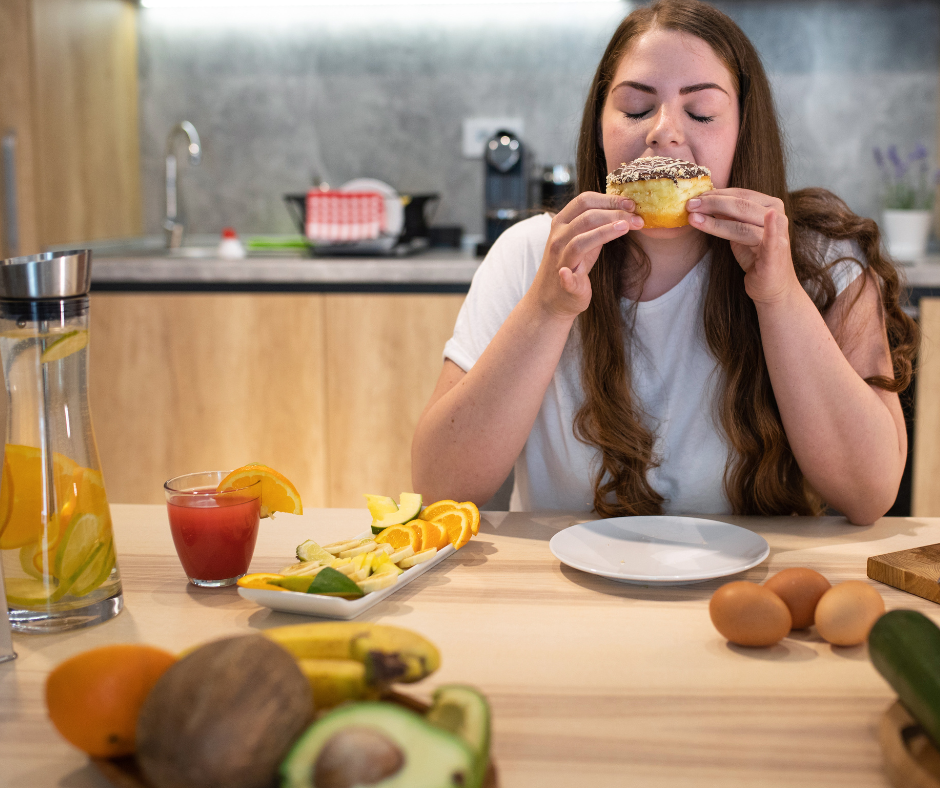
Last Spring, the UK Fashion Retailer New Look was blasted for promoting dieting messages to some of its youngest shoppers. The shop offered a set of pajamas with a pizza slice pattern and the words “cheat day” emblazoned across the chest. This culturally driven, heavily loaded piece of clothing was found in the children’s section, where sizes are dedicated to 7-12 year olds.
I’m sure whoever came up with this idea, as well as the people who approved and produced the product, thought the words were witty, clever, and relevant.
I’m here to tell you, they are not.
This seemingly harmless set of words has a hidden message inside that packs a serious punch. The message on these pajamas screams of persuasion, dieting fads, body type ideals, restriction, food shaming, and ideas and values that are far beyond what a child should be experiencing.
Shouldn’t a child be able to enjoy pizza without designating it to a certain day or a certain category? Shouldn’t a child be able to enjoy pizza without attaching it to guilt and shame? Shouldn’t a child be able to enjoy pizza without forcing it into a category of forbidden and dangerous foods? Shouldn’t a child be able to experience childhood for as long as possible before adults impose upon them their own ideas about dieting and thinness?
And now that we’re talking about it, doesn’t an adult deserve to enjoy their pizza too? Although these clothes were found in a children’s section, would they have been appropriate for women of any age?
The notion of a “cheat day” can be an incredibly damaging and dangerous way to think about food – I know, because I used to do it. After years and years of destructive eating patterns, I put in the work to change my relationship with food, mostly because I didn’t want my daughters to follow suit.
Do we really want our children growing up to think that it’s only okay for them to eat foods they enjoy on one specific day of the week? This mindset sets people up for an unhealthy relationship with food, and for those who are predisposed, to a lifetime of disordered eating habits.
Whenever I hear the phrase “cheat day,” I am immediately taken back to a dinner my husband and I went to several years ago with friends. As out of town guests, they urged us to choose the spot – and I chose my favorite type of food (pizza) without a second thought. When our pizzas arrived, hot and cheesy, my husband’s long-time friend unknowingly exposed his complicated relationship with food. He was sort of rationalizing aloud that it was okay for him to eat this because it was his “cheat day.” Now my husband, who is generally a healthy and active person, has never been a dieter or restrictor. His candid reaction to his friend, a combination of incredulous and amused, was this: “Who are you cheating on?”
If you take a step back, this whole dieting craze and obsession with thinness that we have can make people act a little bit crazy and comical. We begin to label foods as “good” or “bad”, and “clean” or “dirty.” We cycle in and out of restriction days, and days where we eat with more intuition and mindfulness. We create rules for ourselves that cannot be broken, and if they are – the guilt and shame can become burdensome.
We are raising our children to know everything about calories and “good” vs “bad” foods, and nothing about nutrition. We are raising our children to place significant value on body shape and size, and to equate food choices with moral choices. We are raising our children to believe that if they are not thin, they should be dieting. If they are not thin, they cannot be happy or successful. If they are eating pizza, it must be on a “cheat day.”
It’s time to check-in and ask ourselves this very important question: if we live in the mindset of “cheat days” and restriction, who are we actually cheating? What experiences are we missing out on during the rest of our days? What kind of message are we sending to the next generation of women if we create, produce, and wear these pajamas?
It’s a vicious cycle we are imposing on the generations to come, and I’m not buying it.
#NotBuyingIt

